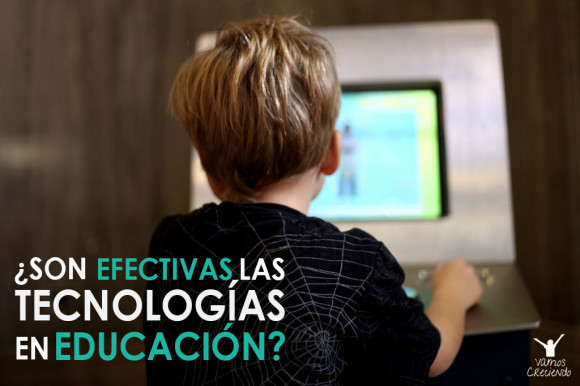
photo credit: bionicteaching via photopin cc
Now I'm back!! 😀 Do not think I've been on vacation yet ...! This week has been a week of unexpected changes but I'm here, with charged batteries and with many looking forward to starting the course. Further, Today I have chosen a subject that interests me a lot and where I'd like to get your opinion.
As you know, I have special interest in the use of ICT in education, and above all, the impact these may have to foster meaningful learning. this interest, I have been reading and researching about, topándome with all kinds of opinions.
When we talk about technology in education is fairly balances the scales. On one side we have those pedagogues totally contrary to the educational use of technology, arguing that children need to experience and touch what they are learning. In the "side" against those educators who have swashbuckling defend the effective use of these. What is my opinion about it? You'll have to read the rest of the post to find out…!
Don Tapscott, author "Growing up in the digital age", states that "Mobile generation is growing up surrounded by bits and their brains are, in fact, different ". Ensures that the way a brain connects, it depends on what you spend your time on, therefore, Wouldn't it be possible that our little ones really, those we call "digital natives", have a different way of accessing knowledge, to process it and, therefore, of learning? Y, if so, Shouldn't we adapt the way we teach them?
With these questions I want us to reach a point that this author also raises and with which I absolutely agree.. Tapscott states that schools have not understood the drastic change that is taking place, do not understand that children do not learn in the same way that we do and, therefore, do not understand that maybe what we should change is the way of teaching.
What do you think you? I believe that we continue teaching exactly the same as it does 50 years old, with some nuances, of course, but it is very difficult for us to change our way of thinking and planning classes. We are not able to understand that the way our students think and process information has changed and if we want them to learn, that they really learn, we will also have to change ourselves and, therefore, our way of transmitting knowledge.
But, How can we know that the use of technologies in education is really effective??
From my point of view, there are still not enough references to prove one hundred percent the effectiveness of these resources in education, but we are on the way and the studies carried out are really encouraging.
There is no doubt the advantage that the Nordic countries bring us in this regard, therefore, not surprisingly, it is these countries that have carried out one of the latest benchmark studies on this topic.
E-learning Nordic 2006 is an association of various Nordic Ministries of Education, through which a study on how ICT affect education and how they act on the role of students.
The main conclusion what has been reached with this study is that the use of technologies in the classroom, raises academic standards. Further, the results show that ICT have a very positive impact on all groups, are of age who are, improving your learning.
But, then, What are the areas in which ICTs have a truly significant impact?? Coming up next, I leave you the answer of this study to this question.
- It has been shown that ICT impact is greater or less depending on the subject.
- In skills like reading and writing ICT has been shown to have a considerable impact.
- Many teachers see ICT as a very useful tool to work diversity. Demonstrating that they have a very positive impact both on those students who stand out and on those who need more reinforcement.
- Some children they pointed out that they generally use the computer more outside of school than within school, but most of all, the differences in the competencies working at each site are highlighted. Generally, more computer-related programs are worked in school and the rest are used outside of school.
This last point is important to mention, because in the post in which we talked about the importance of teaching children to code mentioned the fact that schools continue to give computer classes in which children are taught basic concepts at the user level, but we forget that these children already handle these concepts perfectly and that what they really need is for us to go one step further.
In fact, the negative data of this study is that the full potential of Information and Communication Technologies is not being used in schools.
Another landmark study in this area is the Educational Research Review June 2013, in which previous studies in mathematics teaching were compared to show that educational technology has a very positive effect on academic success.
From my point of view, the question is not in choosing between the digital world or the analog. To really adapt to the needs of children, what we must do is combine them, among other things because children need a combination of learning experiences. What we professionals have to know is what knowledge can be taught effectively with ICT and what cannot. But also, we must go one step further and turn ICT into TAC, Learning and Knowledge Technologies.
CONCLUSION
ICT is one more tool, a way to facilitate the learning process and adapt it to the needs of our students.
Just as a teacher would never leave the entire learning process in the hands of the textbook, we cannot think of technologies as the only way for children to learn.
The problem facing the current educational system is that we believe that giving each student a computer or tablet is the solution, but it's not like that. The solution is to educate children in the responsible use of these devices, teach them that through these they can build their knowledge and, therefore, meet both your leisure and training needs.
As a parent or teacher, you surely have a well-formed opinion on this topic.. I would love to meet it and I hope you share it with us.
Thanks for your time!
“The mobile generation is growing up surrounded by bits and their brains are, in fact, different.”
Don Tapscott
Tags: e-learning, Education, information, interactive, technology, ICT


 Español
Español English
English Français
Français Deutsch
Deutsch 中文(简体)
中文(简体) Português
Português

I love this post. As you have always chosen a topic on the agenda.
As you have very well said, you have to know how to combine the learning they need from experience and manipulation of the environment and those that you can carry out with ICTs..
In my opinion, and from experience, I think for the early childhood education stage, If you do not dare to teach from ICTs, you can use it as a reinforcement of what you have previously taught them, since for children it is something striking, it is a different and motivating experience in which they participate, so it will facilitate meaningful learning.
Thank you very much for sharing these posts
Thank you for your comment Nuria!
I'm glad you find it interesting and, above all, that you as a teacher also believe in the potential of ICT in education.
A hug!!
Hi Cristina. I loved your writing, I absolutely agree with you. I think the hardest thing to beat is the Mental Patterns of Teachers, especially of those who have not yet realized the existence of a new era, where ICT is the dominant medium. Therefore, teachers like you, they are bearers of "good news" for them. Although, I assure, others will dislike you, but "palante" Cristina, as you say, the problem is not the machines, but who make use of them. In this case, of those who do not use them. Successes always.
Hello Luis,
Thank you very much for your message and support!!
You are right, there will be many who will not agree with me, but we must fight for what we believe and more if we know that it is positive and adapts to the needs of our students. Thanks again!
I'm sure that little by little those who, Like you and me, We believe in the potential of ICTs, we will make a place for them in our educational system.
It is very motivating to know that teachers like you strive to provide the best possible education to the children who will later be our future!
Thank you!
Hello Fernando,
Thank you very much for your message!
It is also important that we as teachers receive the motivation of our colleagues.
A hug,
Cristina